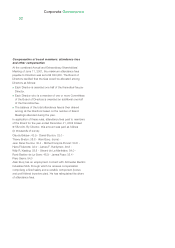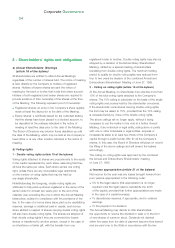APC 2002 Annual Report Download - page 29
Download and view the complete annual report
Please find page 29 of the 2002 APC annual report below. You can navigate through the pages in the report by either clicking on the pages listed below, or by using the keyword search tool below to find specific information within the annual report.
Corporate Governance
28
2 - Organizational and operating
procedures of the Board of Directors
The Board of Directors defines the Company’s business
strategy and ensures that it is properly implemented.
Its members are nominated by the Board and elected
by shareholders in Annual Meeting.
Based on a review by the Remunerations and Appointments
Committee, the Board considers that eight of its thirteen
members are independent directors, as defined in the Bouton
report on corporate governance. Foreign representation is also
significant as the Board includes five non-French Directors.
Employee shareholders are represented by a Director who
sits on the Supervisory Board of the “Schneider Actionnariat”
corporate mutual fund. The average age of the Board
members is 61.
On March 5, 2003, after analyzing the findings of its internal
review, the Board approved a set of operating rules and
procedures. These rules replace previous Board proceedings
that, in particular, limited the powers of the Chairman and
defined the role and organization of Board Committees.
The new rules comprise eight articles.
Article 1 defines the Board’s role and powers. To enable
the Board to fulfill its duties, the Chairman must submit
to its prior authorization all proposals to acquire or sell assets
exceeding 100 million as well as all transactions involving
acommitment by the Company above this amount.
In addition, the Board must carry out an annual review
of its membership, organization and operating procedures.
Article 2 defines the principles the Board shall apply
concerning the renewal of its membership. These include
assuring international representation by maintaining a
significant number of non-French Directors, maintaining
independence through a majority of independent Directors
as defined in the Bouton report, ensuring continuity through
the annual renewal of one quarter of the Directors
and enabling representation of employee shareholders
by a Director who is a member of the Supervisory Board
of a mutual fund invested in Company stock.
Article 3 defines procedures for organizing Board meetings.
In addition to the legal provisions for calling Board meetings,
participation of Directors, minutes, etc., this article reflects
Schneider Electric practices in calling for a minimum of six
meetings a year and the attendance of the Executive Vice-
President, Finance and any line executives concerned by the
major issues put before the Board.
Article 4 defines the status of Directors and their
responsibilities. These include:
- Representing all shareholders and acting in the corporate
interest.
- Submitting their resignation when they have not participated
in more than half the Board meetings.
- Respecting an obligation of confidentiality.
- Requesting any documents needed to fulfill their
responsibilities and meeting with Company executives as
required.
- Reporting conflicts of interest.
- Owning at least 250 shares of Company stock.
- Complying with rules governing trading in Schneider Electric
shares.
- Attending the Annual Shareholders’ Meeting.
Articles 5 to 7 apply to the Board Committees and are
described in the corresponding section below.
Schneider Electric has adopted a code of ethics for Directors
and employees designed to prevent insider trading. Under the
terms of this code, both Directors and employees are barred
from trading shares in companies for which they have
information that has not yet been made public. In addition,
they may not trade Schneider Electric SA shares during
the 30 days preceding publication of the annual and interim
financial statements, nor may they engage in any type
of speculative trading involving Schneider Electric SA shares.
This includes margin trading, trading in options and warrants
and purchasing and re-selling securities in a period of less
than four months.
























